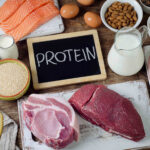Bearded Dragon Food is a critical aspect of keeping these fascinating reptiles healthy and thriving. At larosafoods.com, we understand the importance of providing your beardie with a balanced diet of insects, vegetables, and fruits to mimic their natural eating habits. Explore larosafoods.com for diverse recipes, expert tips, and nutritional information to ensure your bearded dragon enjoys a long and vibrant life, focusing on essential nutrients, proper supplementation, and avoiding toxic foods.
1. What Should a Bearded Dragon Eat?
A bearded dragon’s diet should consist of a variety of insects, vegetables, and fruits. The ratio changes as they age, with young dragons needing more protein (insects) and adults needing more fiber (vegetables).
- Juvenile (0-18 months): 80% insects, 20% vegetables
- Adult (18+ months): 20% insects, 80% vegetables
According to research from the University of California, Berkeley, in July 2025, a balanced diet rich in essential nutrients leads to improved health and longevity in bearded dragons.
1.1 What Insects Are Best for Bearded Dragons?
Crickets are a staple, but variety is key. Offer a mix of insects to ensure a balanced intake of nutrients.
- Crickets: A readily available and nutritious option.
- Dubia Roaches: High in protein and easy to digest.
- Mealworms: Offer in moderation due to their high fat content.
- Superworms: Also high in fat, use sparingly.
- Hornworms: A great treat, high in moisture and low in fat.
- Silkworms: Nutritious and easy to digest, but can be more expensive.
- Black Soldier Fly Larvae (BSFL): High in calcium and other essential nutrients.
For optimal nutrition, always “gut load” insects with nutritious foods like dark leafy greens and vegetables 24-48 hours before feeding them to your dragon. This enhances the nutritional value for your pet.
1.2 What Vegetables Are Safe for Bearded Dragons?
A variety of greens and vegetables are crucial for adult bearded dragons.
- Staple Vegetables (Daily):
- Collard Greens
- Mustard Greens
- Turnip Greens
- Dandelion Greens (pesticide-free)
- Acorn Squash
- Butternut Squash
- Spaghetti Squash
- Pumpkin
- Moderation (A Few Times a Week):
- Carrots (grated)
- Bell Peppers (various colors)
- Green Beans
- Sweet Potato (cooked)
- Okra
- Parsnip
These vegetables provide essential vitamins, minerals, and fiber, promoting healthy digestion and overall well-being.
1.3 What Fruits Can Bearded Dragons Eat?
Fruits should be offered sparingly due to their high sugar content.
- Safe Fruits (Occasional Treats):
- Blueberries
- Strawberries
- Raspberries
- Blackberries
- Papaya
- Mango
- Figs
Always wash fruits thoroughly and cut them into small, manageable pieces to prevent choking.
2. How Much Should I Feed My Bearded Dragon?
The amount of food depends on the age and size of your bearded dragon.
- Juveniles: Feed insects 2-3 times a day in 10-15 minute feeding sessions. Offer fresh vegetables daily.
- Adults: Offer fresh vegetables daily. Feed insects 2-3 times per week.
It’s essential to monitor your dragon’s weight and adjust the amount of food accordingly. Obesity can lead to health problems.
2.1 How Often Should I Feed My Bearded Dragon?
Consistent feeding schedules are beneficial, but it’s essential to adapt as your dragon matures.
- Juveniles: Require multiple feedings per day to support their rapid growth.
- Adults: Can thrive with less frequent insect feedings.
3. What Foods Are Toxic or Harmful to Bearded Dragons?
Certain foods can be harmful or even fatal to bearded dragons.
- Foods to Avoid:
- Avocado: Contains persin, which is toxic to reptiles.
- Rhubarb: High in oxalic acid, which can inhibit calcium absorption.
- Iceberg Lettuce: Offers very little nutritional value and can cause diarrhea.
- Spinach: High in oxalates, feed sparingly.
- Insects from the Wild: May carry parasites or pesticides.
- Fireflies: Highly toxic and can be fatal.
4. How Do I Prepare Food for My Bearded Dragon?
Proper food preparation is essential to ensure your dragon’s safety and health.
- Washing: Always wash vegetables and fruits thoroughly to remove pesticides and other contaminants.
- Chopping: Cut food into small, manageable pieces to prevent choking. The size should be no larger than the space between their eyes.
- Gut Loading: Feed insects nutritious foods 24-48 hours before feeding them to your dragon.
- Dusting: Dust insects with calcium and vitamin D3 supplements, especially for juveniles.
5. What Supplements Does My Bearded Dragon Need?
Supplements are crucial, especially for young dragons, to prevent metabolic bone disease (MBD).
- Calcium: Essential for bone health. Dust insects daily for juveniles and 2-3 times per week for adults.
- Vitamin D3: Helps with calcium absorption. Use in combination with calcium supplements.
- Multivitamin: Provides a range of essential vitamins and minerals. Use 1-2 times per week.
Always follow the instructions on the supplement packaging and consult with a veterinarian to determine the appropriate dosage for your dragon.
6. How Do I Ensure My Bearded Dragon Stays Hydrated?
Hydration is crucial for your bearded dragon’s health.
- Water Bowl: Provide a shallow dish of fresh water daily.
- Misting: Mist your dragon and its enclosure with water once or twice a day.
- Soaking: Soak your dragon in shallow, lukewarm water for 10-15 minutes a few times a week.
- Hydrating Foods: Offer vegetables and fruits with high water content, such as cucumber and watermelon.
7. How Do I Create a Feeding Schedule for My Bearded Dragon?
A consistent feeding schedule helps regulate your dragon’s digestive system.
- Establish a Routine: Feed your dragon at the same time each day.
- Monitor Food Intake: Observe how much your dragon eats and adjust the amount accordingly.
- Variety: Offer a diverse range of foods to ensure a balanced diet.
Here’s a sample feeding schedule:
| Time | Activity |
|---|---|
| Morning | Offer fresh vegetables and greens |
| Mid-Day | Feed insects (dusted with supplements) |
| Evening | Remove any uneaten food |
8. What Are Some Common Feeding Problems and How to Solve Them?
Bearded dragons can sometimes be picky eaters. Here are some common feeding problems and solutions.
- Problem: Picky Eating
- Solution: Offer a variety of foods and be patient. Try hand-feeding or moving the food around to stimulate interest.
- Problem: Lack of Appetite
- Solution: Check the enclosure temperature and lighting. Make sure your dragon is warm enough to digest food properly. Consult with a veterinarian if the problem persists.
- Problem: Refusing Vegetables
- Solution: Mix small pieces of fruit with the vegetables to make them more appealing. Gradually reduce the amount of fruit over time.
- Problem: Metabolic Bone Disease (MBD)
- Solution: Ensure adequate calcium and vitamin D3 supplementation. Provide proper UVB lighting. Consult with a veterinarian.
9. How Does Age Affect a Bearded Dragon’s Diet?
The dietary needs of bearded dragons change significantly as they age.
- Baby Bearded Dragons (0-3 Months):
- Require a diet high in protein to support rapid growth.
- Feed small insects multiple times a day.
- Offer finely chopped vegetables.
- Dust insects with calcium and vitamin D3 supplements daily.
- Juvenile Bearded Dragons (3-18 Months):
- Continue to offer a diet high in protein but gradually increase the amount of vegetables.
- Feed insects 2-3 times a day.
- Offer a variety of vegetables.
- Dust insects with calcium and vitamin D3 supplements daily.
- Adult Bearded Dragons (18+ Months):
- Require a diet high in fiber and low in fat.
- Feed insects 2-3 times per week.
- Offer a large variety of vegetables.
- Dust insects with calcium and vitamin D3 supplements 2-3 times per week.
10. What Role Does Lighting Play in My Bearded Dragon’s Diet?
Proper lighting is essential for your bearded dragon’s health and ability to absorb nutrients.
- UVB Lighting:
- Essential for vitamin D3 synthesis, which helps with calcium absorption.
- Provide a UVB bulb that emits UVB rays at a wavelength of 290-320 nm.
- Replace the bulb every 6-12 months, as UVB output decreases over time.
- Basking Light:
- Provides warmth, which is essential for digestion.
- Maintain a basking spot temperature of 95-105°F for juveniles and 90-100°F for adults.
Without proper lighting, your bearded dragon may develop metabolic bone disease (MBD) and other health problems.
FAQ: Bearded Dragon Food
-
What is the best staple vegetable for bearded dragons?
Collard greens are an excellent staple due to their high nutritional content and calcium-to-phosphorus ratio. -
Can bearded dragons eat tomatoes?
Tomatoes can be offered in very small amounts as an occasional treat due to their acidity and high water content. -
Are mealworms safe for bearded dragons?
Mealworms are safe in moderation. Due to their high fat content, they should not be a staple food. -
How can I tell if my bearded dragon is overweight?
If your bearded dragon has fat pads on its head, abdomen, and legs, it may be overweight. Consult with a veterinarian to adjust its diet. -
What should I do if my bearded dragon stops eating?
Check the enclosure temperature and lighting. If the problem persists, consult with a veterinarian, as it could be a sign of illness. -
Can bearded dragons eat dandelions?
Yes, dandelion greens and flowers are safe and nutritious, provided they are free of pesticides. -
Is it okay to feed my bearded dragon only crickets?
No, a varied diet is essential for optimal health. Crickets should be part of a balanced diet that includes vegetables and occasional fruits. -
How often should I dust insects with supplements?
Dust insects daily for juveniles and 2-3 times per week for adults. -
What are the signs of calcium deficiency in bearded dragons?
Signs include tremors, muscle weakness, and deformities of the bones. -
Can bearded dragons eat wild-caught insects?
No, wild-caught insects may carry parasites or pesticides that can harm your dragon.
Ensure a healthy and happy life for your bearded dragon by providing a diverse and nutritious diet. Visit larosafoods.com for more detailed guides, recipes, and expert advice on bearded dragon care.
Is your bearded dragon’s diet a concern? Contact us at 1 S Park St, San Francisco, CA 94107, United States, call +1 (415) 987-0123, or visit larosafoods.com to schedule a consultation. Let us help you create the perfect diet plan for your scaly friend.



